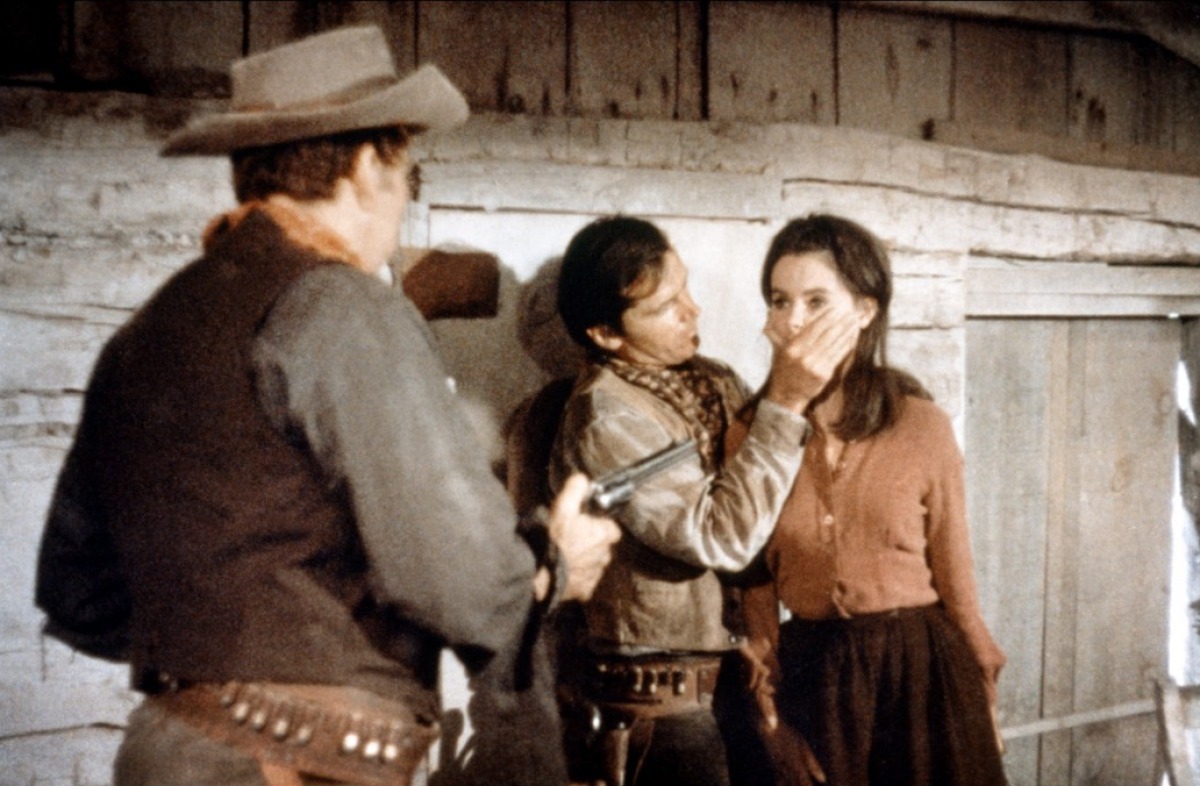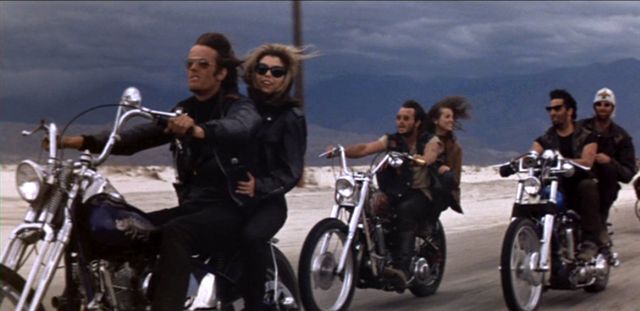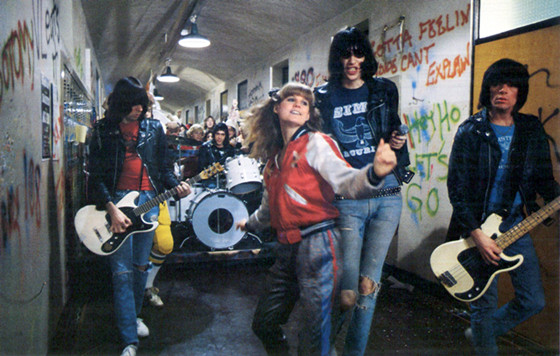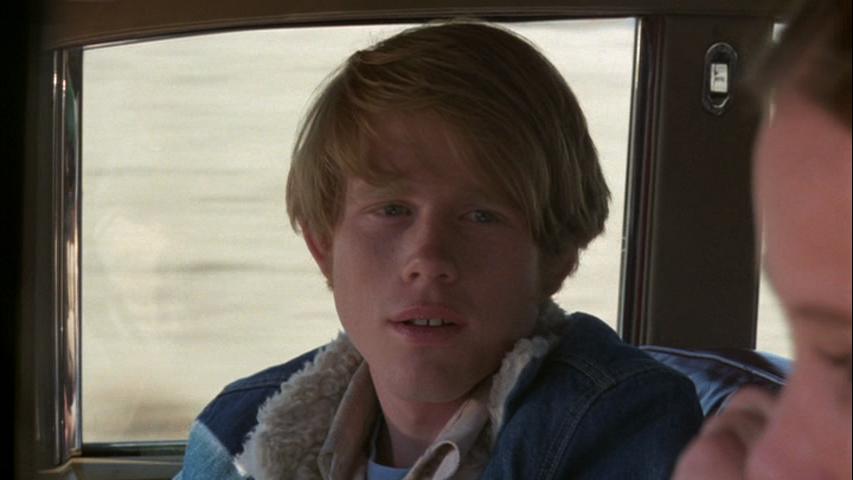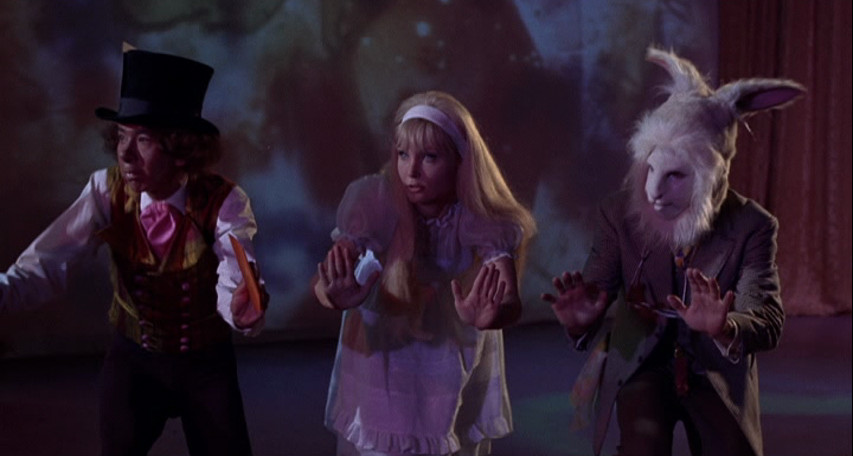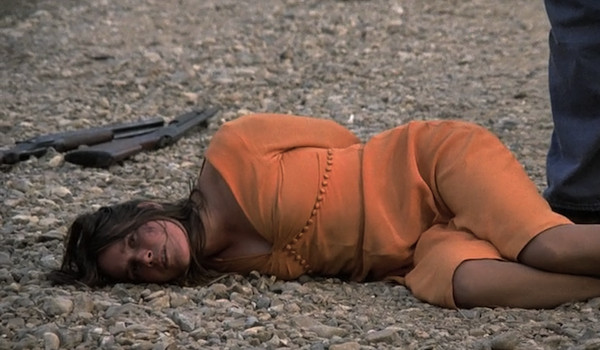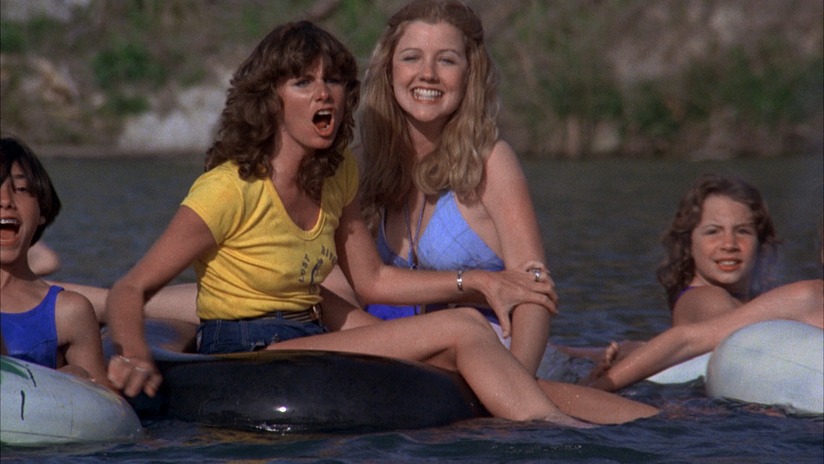15. The Shooting (Executive Producer, 1966)
Genre: Western, Existential
Film Plot: Willett Gashade (Warren Oates), an ex-bounty hunter is returning home after searching for his brother and is met by Coley (Will Hutchins), a cowboy trying to pull himself together after witnessing the murder of his best friend and the beautiful but feisty “Woman” (Millie Perkins), Gashade reluctantly agrees to escort her through the desert. Along the way, he begins to suspect that she is trailing someone, which is confirmed after Billy Spear (Jack Nicholson) joins the party. Unsure of their target, Gashade and Coley continue to inch forward, weary of Billy Spear’s menacing presence.
Production Notes: Corman sent cult director Monte Hellman and actor Jack Nicholson out to the desert to shoot two westerns. After six weeks they came back with this one and Ride in the Whirlwind which Nicholson also wrote. Nicholson helped produce both films as well and Hellman has said that he deeply regrets it because they would fight constantly.
Why It’s Essential: Considered the first “acid” western. The performances of Nicholson and Warren Oates are great as well.
14. The Wild Angels (Director, 1966)
Genre: Biker, Drama
Film Plot: Heavenly Blues (Peter Fonda), leader of an outlaw biker gang, tells his friend Joe ‘Loser’ Kearns (Bruce Dern) that he had located Kearns’ stolen motorcycle. While trying to retrieve the bike, Loser is shot in the back by a police patrol and goes to the hospital. Loser eventually dies and the gang throws a wild party.
Production Notes: To save costs and add to the authenticity of the film, Corman hired several real life Hell’s Angels to be extras. Actress Laura Dern, daughter of co-stars Bruce Dern and Diane Ladd was also conceived during filming.
Why It’s Essential: This is the film that inspired the outlaw biker film genre and Leonard Maltin said it was “OK after about 24 beers”.
13. Rock ‘n’ Roll High School (Producer, 1979)
Genre: Musical, Comedy
Film Plot: High-schooler Riff Randell’s (P.J. Soles) efforts to meet the Ramones are continually thwarted by her rock & roll-hating principal Evelyn Togar (Mary Woronov). A pimply student (Clint Howard) also tries to score a date with her.
Production Notes: The high school they filmed at was set to be demolished so Corman had it written in the script and filmed the actual demolition to up the production value. Although the version of the story varies, apparently Corman originally wanted Cheap Trick but couldn’t get them and it was actor Paul Bartell that suggested The Ramones.
During the shoot, Dee Dee Ramone got arrested for fighting with a roadie, overdosed in jail, and had to use most of the money he earned from the film to pay his huge hospital bill. During The Ramones’ concert at The Roxy near the end of the film, Darby Crash, the late lead singer of the seminal punk band The Germs can be seen in the front row.
Why It’s Essential: Great soundtrack and The Ramones are in it. Make sure you watch the credits in the end, as an inside joke regarding Corman’s stingy budget on the movie, sounds of birds going “cheap, cheap, cheap” can be heard as the New World Picture credit appears on screen.
12. Machine Gun Kelly (Director, 1958)
Genre: Mobster, Action
Film Plot: George Kelly (Charles Bronson), dubbed “Machine Gun” by his partner in crime, tough talking Flo Becker (Susan Cabot) because of his obsession with that weapon, eventually becomes Public Enemy Number One. A botched robbery causes one of their partners, Michael Fandango (Morey Amsterdam) to lose an arm.
Kelly, goaded on by Flo, kidnaps the daughter of a wealthy businessman for ransom. Fandango fingers him to the police, but is killed by one of Kelly’s gang as the house is surrounded. Discord grows among his inner circle, and Kelly, deathly afraid of being jailed or killed, is dominated and ridiculed by Flo. Frustrated, Kelly slugs her with his fist, knocking her unconscious and both are taken away to jail.
Production Notes: Corman regular Dick Miller, was originally scheduled to play the title role, but writer R. Wright Campbell didn’t like him and kept pushing for his brother William Campbell to play him and even started to tailor the script to fit his brother’s strengths. Corman cast relative unknown Bronson instead to avoid internal squabbling.
Why It’s Essential: Charles Bronson (in his first lead role) kicking ass in black and white. Need I say more?
11. Grand Theft Auto (Producer, 1977)
Genre: Action, Comedy
Film Plot: After her parents disapprove of her engagement to Sam Freeman (Ron Howard), heiress Paula Powers (Nancy Morgan) steals her dad’s Rolls Royce and picks up Sam to elope in Vegas. A wild and explosive car chase ensues.
Production Notes: Ron Howard had written a comedy with his father called Tis the Season and approached Corman to co-finance it. Corman wasn’t enthusiastic about the script but said that if Howard agreed to star in his car movie, Eat My Dust, he would not only finance the film but he would also let Howard develop and direct another movie. Grand Theft Auto was that movie. Corman said to Howard during filming, “Conditions are rough, not much money. But if you do a good job on this movie, you’ll never work for me again.” Howard later said that he appreciated Corman’s sentiment.
Why It’s Essential: It’s Ron Howard’s directorial debut.
10. The Trip (Director, 1967)
Genre: Psychadelic
Film Plot: Paul Groves (Peter Fonda), a television commercial director in the midst of a personality crisis, seeks the help of his self-styled guru friend John (Bruce Dern) to guide him through his first “trip” with LSD. Paul experiences visions of sex, death, strobe lights, flowers, dancing girls, witches, hood riders, a torture chamber, and a dwarf. He obviously panics but John’s friend Max (Dennis Hopper) tells him to “go with it, man”.
Production Notes: Corman did research for the film by taking LSD himself. Many of the visuals and editing were inspired by his “trip”. He had a good experience so he had to ask others what a “bad trip” was like in order to incorporate it into the film. Peter Fonda, Dennis Hopper, and Jack Nicholson also engaged in a group LSD trip to prepare for the film. If you don’t blink you may catch Gram Parsons as well.
Why It’s Essential: An LSD movie starring Peter Fonda, Bruce Dern, and Dennis Hopper and written by Jack Nicholson. What more could you ask for?
9. Boxcar Bertha (Director, 1972)
Genre: Crime, Drama
Film Plot: Bertha Thompson (Barbara Hershey) meets and falls in love with Bill Shelly (David Carradine), they turn to life of crime by robbing trains. When Bertha is implicated in the death of a wealthy gambler, the pair become fugitives.
Production Notes: Instead of direct sequels, Corman would often do “repeats” — similar characters, set up, etc. This was a repeat of Bloody Mama. After he finished the film, Scorsese screened it for John Cassavetes. After the screening was over, Cassavetes hugged Scorsese and said, “Marty, you’ve just spent an entire year making a piece of shit. It’s a good picture but you’re better than the people who make this kind of movie. Don’t get hooked into the exploitation market, just try and do something different.” That was the last time Scorsese worked with Corman for he made Mean Streets a year later. Scorsese did say this about Corman though, “He’s not only a great mentor. He’s an artist, the best kind of artist, able to nurture and inspire talent in a generous way.”
Why It’s Essential: Scorsese directed it.
8. Piranha (Producer, 1978)
Genre: Horror, Comedy
Film Plot: After two teenagers go missing near Lost River Lake, Maggie McKeon (Heather Menzies), an insurance investigator, is dispatched to find them. She finds an abandoned military facility and meets Dr. Robert Hoak (Kevin McCarthy) who ran a top secret project to breed piranhas for use in the Vietnam War. Some on those piranhas get loose and reek havok on a children’s summer camp and a newly opened tourist resort.
Production Notes: Corman created this Jaws parody because he wanted to catch the wave of its sequel, Jaws 2. Universal wanted to file an injunction but, after catching a screening of it, Spielberg convinced them not to. It was John Sayles screenwriting debut and he used the profits from the film to fund his own future projects.
Why It’s Essential: Joe Dante directed it and John Sayles wrote it. Steven Spielberg called it “the best of the Jaws ripoffs”.
